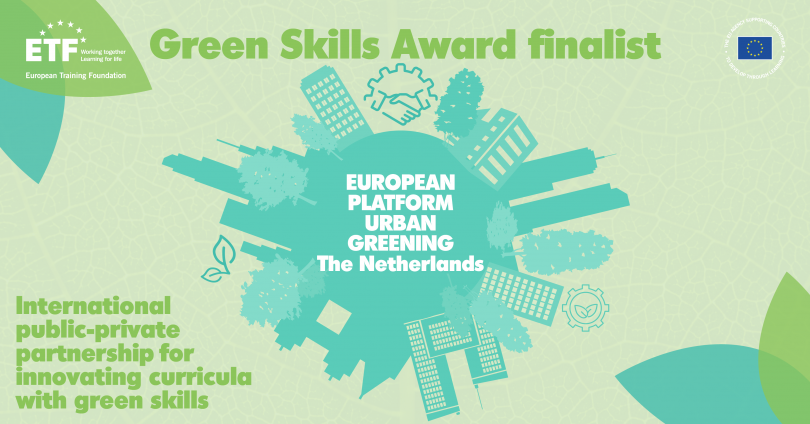
The Netherlands - Rediscovering the ETF Green Skills Award finalists
Roughly 40 percent of the European Union’s populace lives in urban areas. Under the EU Green Deal, and the transition to a green economy, urban areas need to become decidedly more eco-friendly. To do so is no easy feat, requiring the input of the public and private sectors to develop viable projects.
Jan Jeronimus, Project Leader of the European Platform for Urban Greening (EPLUG), is keen on practical examples to address the challenges ahead. “Paris is planning to remove more than half of its 140,000 parking spaces to make the city greener, but the question is, what will be there instead? And who is going to maintain it? We all know we need to do something, but the solutions need to be very practical. Often scientific research is just that, research, so we’ll try to translate that into action. We are trying to keep things manageable, practice orientated and preferably locally orientated,” he says.
EPLUG was established at the end of 2020, co-funded by the Erasmus+ Programme of the EU, with Wellant College in the Netherlands the leading beneficiary. Jan is the head of the college’s international office, tasked with building up the partnership with five other centres of vocational excellence in the Czech Republic, Denmark, Finland, Romania, and Spain.
“We all feel its an essential topic as we need to address climate change, reverse decreasing biodiversity, and take care of the well-being of urban dwellers. But it’s a challenge we can’t solve on our own, so we set up six centres of vocational excellence as six skills ecosystems that will be connected through one EU platform,” he says.
EPLUG brings together a broad range of stakeholders, from VET providers to municipalities, regional authorities, companies and NGOs. “Basically anybody and everybody with a stake in urban greening,” he says.
Through working together common strategies can be developed, but also in local contexts, given the disparities between the six countries involved, be it in approaches to VET, but also the climate and biodiversity.
“What works in the Netherlands might not work in Spain and Romania. We share the same vision for urban greening, but how it is to be done might vary from one region to another. The same goes for maintaining centres of vocational excellence, to make sure each centre can be maintained independently, either funded by government and/or with companies,” says Jan.
A practical example of what EPLUG is aiming to achieve is to develop the concept of the Living Building, with green facades rich with lush vegetation that bolsters biodiversity, and green living interiors, all intended to improve the urban ecosystem for humans and wildlife.
In Utrecht in the Netherlands, a luxury apartment tower block is to be constructed with green balconies that will have trees of up to 60 metres high. The skills required to develop such a project encompasses standard construction and engineering skills, but also ecologists and landscape gardeners for development and maintenance.
“Companies will need skilled employees to take care of the greening, as residents will not always know what to do, and will want it done for them. Green facades and roof-top gardens will require new skills, such as a climbing certificate to work safely at height. That has never been part of the VET curriculum, so an example of how we should adjust our training based on the needs of the labour market. That is why we need constant conversations and alignment with companies,” says Jan.
EPLUG’s website exemplifies such a green job, with a built-in video of a gardener suspended in a harness ascending and descending a building pruning plants.
While getting a climbing certificate may be part of adapting to new urban design, the urban landscaper and gardener needed for the green transition will also require education about biodiversity and climate change: What plants and trees to plant? How much water will be required? How will plants adapt to the changing climate?
Jan gave the example of VET gardening and landscaping courses in Romania being highly traditional. “The focus right now is on a good-looking garden, not biodiversity and climate change. This extra layer is not included yet in curricula,” says Jan.
The lack of a unified VET system across the EU is a challenge EPLUG is working to address among its centres. “One of the ways we’ve tried to solve this issue is by using learning outcomes, to leave it up to countries to work towards outcomes in their own way. That is why we want to involve ministries of education about what we are doing, and for the outcomes to be inputs for reform and updates to ways of working,” says Jan.
While EPLUG is just six months old, it is already envisioning a greener urban future. “We are dreaming of a vertical greening innovative centre. It would be so cool if we could have people actually experience what a living green building is like, and how to maintain it,” he says.
Did you like this article? If you would like to be notified when new content like this is published, subscribe to receive our email alerts.